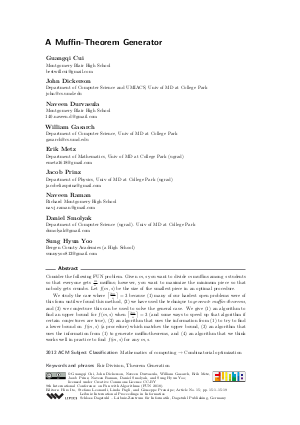A Muffin-Theorem Generator
Authors Guangqi Cui, John Dickerson, Naveen Durvasula, William Gasarch, Erik Metz, Jacob Prinz, Naveen Raman, Daniel Smolyak, Sung Hyun Yoo
-
Part of:
Volume:
9th International Conference on Fun with Algorithms (FUN 2018)
Part of: Series: Leibniz International Proceedings in Informatics (LIPIcs)
Part of: Conference: International Conference on Fun with Algorithms (FUN) - License:
 Creative Commons Attribution 3.0 Unported license
Creative Commons Attribution 3.0 Unported license
- Publication Date: 2018-06-04
File

PDF
LIPIcs.FUN.2018.15.pdf
- Filesize: 477 kB
- 19 pages
Document Identifiers
Related Versions
Subject Classification
ACM Subject Classification
- Mathematics of computing → Combinatorial optimization
Keywords
- Fair Division
- Theorem Generation
Metrics
- Access Statistics
-
Total Accesses (updated on a weekly basis)
0PDF Downloads0Metadata Views
Abstract
Consider the following FUN problem. Given m,s you want to divide m muffins among s students so that everyone gets m/(s) muffins; however, you want to maximize the minimum piece so that nobody gets crumbs. Let f(m,s) be the size of the smallest piece in an optimal procedure. We study the case where ceil(2m/s)=3 because (1) many of our hardest open problems were of this form until we found this method, (2) we have used the technique to generate muffin-theorems, and (3) we conjecture this can be used to solve the general case. We give (1) an algorithm to find an upper bound for f(m,s) when ceil(2m/s)(and some ways to speed up that algorithm if certain conjectures are true), (2) an algorithm that uses the information from (1) to try to find a lower bound on f(m,s) (a procedure) which matches the upper bound, (3) an algorithm that uses the information from (1) to generate muffin-theorems, and (4) an algorithm that we think works well in practice to find f(m,s) for any m,s.
Cite As Get BibTex
Guangqi Cui, John Dickerson, Naveen Durvasula, William Gasarch, Erik Metz, Jacob Prinz, Naveen Raman, Daniel Smolyak, and Sung Hyun Yoo. A Muffin-Theorem Generator. In 9th International Conference on Fun with Algorithms (FUN 2018). Leibniz International Proceedings in Informatics (LIPIcs), Volume 100, pp. 15:1-15:19, Schloss Dagstuhl – Leibniz-Zentrum für Informatik (2018)
https://doi.org/10.4230/LIPIcs.FUN.2018.15
BibTex
@InProceedings{cui_et_al:LIPIcs.FUN.2018.15,
author = {Cui, Guangqi and Dickerson, John and Durvasula, Naveen and Gasarch, William and Metz, Erik and Prinz, Jacob and Raman, Naveen and Smolyak, Daniel and Yoo, Sung Hyun},
title = {{A Muffin-Theorem Generator}},
booktitle = {9th International Conference on Fun with Algorithms (FUN 2018)},
pages = {15:1--15:19},
series = {Leibniz International Proceedings in Informatics (LIPIcs)},
ISBN = {978-3-95977-067-5},
ISSN = {1868-8969},
year = {2018},
volume = {100},
editor = {Ito, Hiro and Leonardi, Stefano and Pagli, Linda and Prencipe, Giuseppe},
publisher = {Schloss Dagstuhl -- Leibniz-Zentrum f{\"u}r Informatik},
address = {Dagstuhl, Germany},
URL = {https://drops.dagstuhl.de/entities/document/10.4230/LIPIcs.FUN.2018.15},
URN = {urn:nbn:de:0030-drops-88062},
doi = {10.4230/LIPIcs.FUN.2018.15},
annote = {Keywords: Fair Division, Theorem Generation}
}
Author Details
References
- Guangiqi Cui, John Dickerson, Naveen Durvasula, William Gasarch, Erik Metz, Jacob Prinz, Naveen Raman, Daniel Smolyak, and Sung Hyun Yoo. Code for muffin problems, 2017. URL: https://github.com/jeprinz/MuffinProblem.
- Guangiqi Cui, John Dickerson, Naveen Durvasula, William Gasarch, Erik Metz, Jacob Prinz, Naveen Raman, Daniel Smolyak, and Sung Hyun Yoo. The muffin problem, 2017. URL: https://arxiv.org/abs/1709.02452.
- Alan Frank. The muffin problem, 2013. Described to Jeremy Copeland and in the New York Times Numberplay Online Blog URL: https://wordplay.blogs.nytimes.com/2013/08/19/cake.
